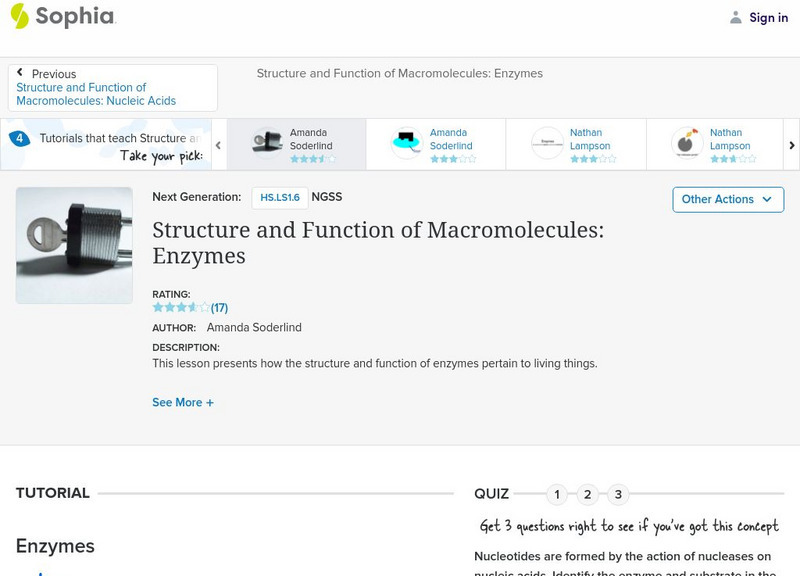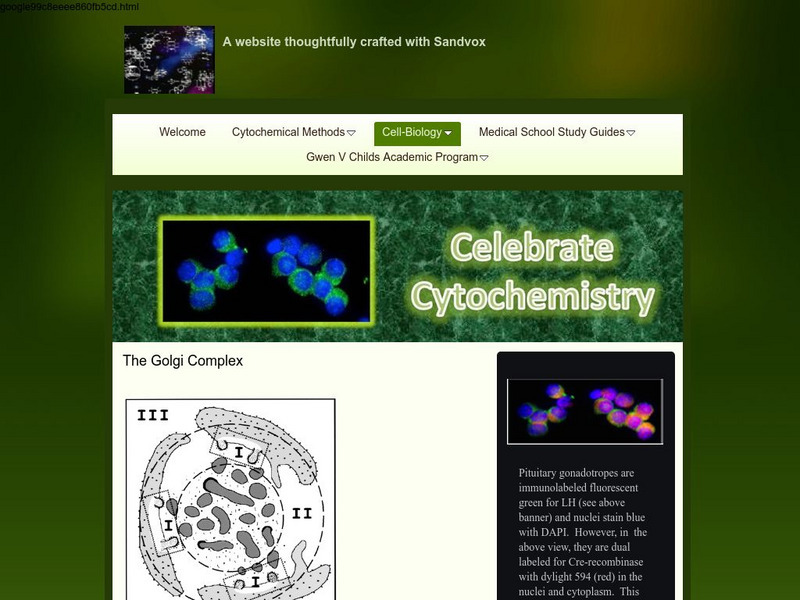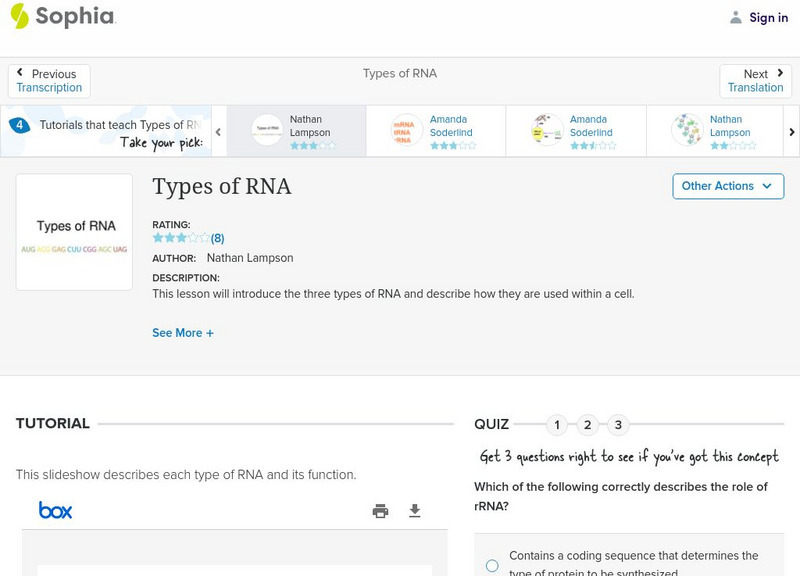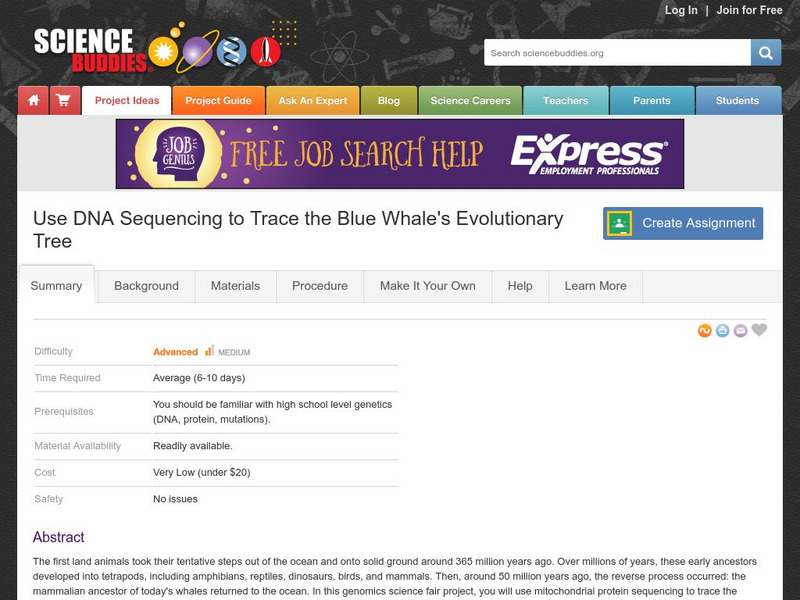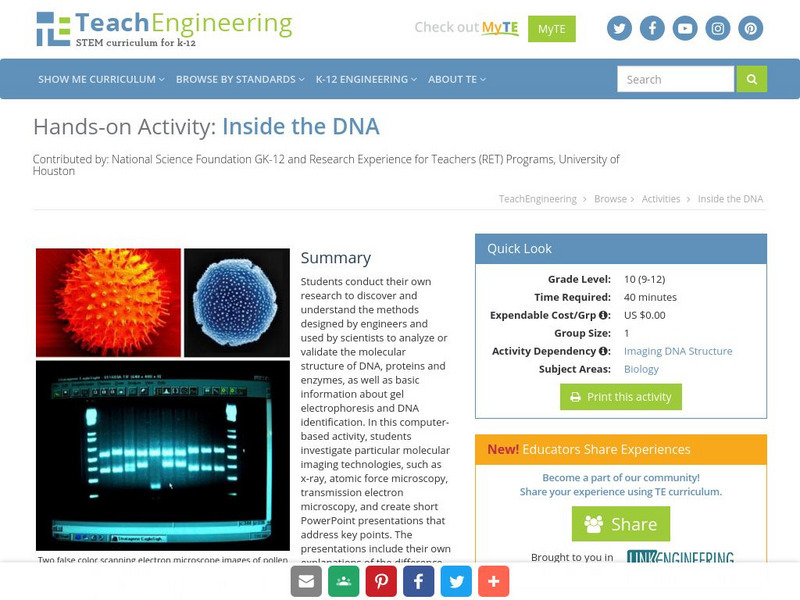Other
Virtual Chembook: Characteristics and Properties of Amino Acids
Each amino acid has at least one amine and one acid functional group as the name implies. The different properties result from variations in the structures of different R groups. The R group is often referred to as the amino acid side...
Sophia Learning
Sophia: Structure and Function of Macromolecules: Enzymes: Lesson 3
This lesson presents how the structure and function of enzymes pertain to living things. It is 3 of 4 in the series titled "Structure and Function of Macromolecules: Enzymes."
Sophia Learning
Sophia: Structure and Function of Macromolecules: Enzymes: Lesson 4
This lesson presents how the structure and fun#tion /f enzymes pertain to living things. It is 4 of 4 in the series titled "Structure and Function of Macromolecules: Enzymes."
Cosmo Learning
Cosmo Learning: Introductory Biology
A collection of video lectures from an introduction to biology course taught at Massachusetts Institute of Technology. The course covers fundamental topics like biochemistry, genetics, molecular biology, and cell biology with thirty-four...
Other
Golgi Complex: Structure and Function
How do proteins move to the Golgi Complex? What types of secretion are controlled by the Golgi complex? How does Golgi complex regulate the insertion of plasma membrane proteins? Can proteins be transported back to the rough endoplasmic...
Chem4kids
Chem4 Kids: Acids in Proteins
The first thing you might be asking is, "What is an amino acid?" There are more than fifty, and each one of them is a little different. Amino acids are used in every cell of your body to build the proteins you need to survive. All...
Khan Academy
Khan Academy: Nucleus and Ribosomes
Discussion in detail of the structure and function of the nucleus and ribosomes of a cell and how they work together in the production of proteins.
Khan Academy
Khan Academy: The Cytoskeleton
There are three types of protein fibers in the cytoskeleton: microfilaments, intermediate filaments, and microtubules. This resource examines each type of filament, as well as some specialized structures: flagella, cilia, and centrosomes.
Other
Hypertextbook: Large Molecules
This is a good, in-depth reference for the study of macromolecules in biology - lipids, proteins and carbohydrates. Includes images and links to other sources as well as a quiz for students to check understanding.
Other
Center for Game Science: Fold It
A game where students put amino acids together to form a protein. Students will also try to predict how that protein will fold. Since the function of a protein depends a lot on the structure, this game can help students understand the...
Estrella Mountain Community College
Online Biology Book: Chemistry Ii: Water and Organic Molecules
Online biology textbook discussing the chemical nature of water, and the importance of its molecular structure to life. Also discusses at length the organic molecules nucleic acids, proteins, lipids, and carbohydrates.
National Health Museum
Nhm: Amino Acid Sequences Show Evolution
This lesson plan focuses on differences in the amino acid sequence of hemoglobin and myoglobin proteins. They use the number of differences to create a phylogenetic tree.
CK-12 Foundation
Ck 12: Biology: Ribosomes and Mitochondria
[Free Registration/Login may be required to access all resource tools.] Describes the structure and function of ribosomes and mitochondria.
Cells Alive
Cells Alive!
Animation studio that specializes in medical illustration lets you explore the structure and function of plant cells and animal cells, using videos and interactive graphics with clickable parts that lead to more detail.
Sophia Learning
Sophia: Types of Rna
A brief overview presenting the three types of RNA responsible for protein synthesis in the cell.
Chem4kids
Chem4 Kids: Browsing Biochemistry
Here you can learn about biochemistry, the chemistry of the living world. Content explores carbohydrates, lipids, amino acid structure and proteins, enzymes, nucleic acids, and metabolism.
Science Buddies
Science Buddies: Use Dna Sequencing to Trace the Blue Whale's Evolutionary Tree
Around 50 million years ago, the mammalian ancestor of today's whales returned to the ocean. In this genomics science fair project, you will use mitochondrial protein sequencing to trace the evolution of whales and identify their closest...
CPALMS
Florida State University Cpalms: Florida Students: Macromolecules of Life: The Overview
Get a tour of the four basic biological macromolecules structure and function in this tutorial. Learn about carbohydrates, lipids, proteins, and nucleic acids.
TeachEngineering
Teach Engineering: Cell Membrane Color Sheet and Build a Cell Membrane
Students color-code a schematic of a cell and its cell membrane structures. Then they complete the "Build-a-Membrane" activity found at http://learn.genetics.utah.edu. This reinforces their understanding of the structure and function of...
TeachEngineering
Teach Engineering: Inside the Dna
Students conduct their own research to discover and understand the methods designed by engineers and used by scientists to analyze or validate the molecular structure of DNA, proteins and enzymes, as well as basic information about gel...
Concord Consortium
Concord Consortium: Stem Resources: Molecular Self Assembly
A series of science simulations exploring how molecules assemble themselves and how scientists are learning to engineer their structure. Students will discover what patterns molecules form with interactive lessons. At the end there is a...
Encyclopedia of Earth
Encyclopedia of Earth: Microbiology: Dna
Describes the structure and coding of DNA, how it replicates, and the role it plays at the cellular level. Looks at past and current research on DNA, and applications of this research. (Published: September 25, 2010)
University of Utah
University of Utah: Learn Genetics: Bringing Rna Into View
What molecules were involved in the origin of life? This series explores the roles of RNA, DNA, and protein. Special attention is given to RNA because of its ability to perform several tasks necessary for life processes. All of the...
Howard Hughes Medical Institute
Hhmi: Biointeractive: The Eukaryotic Cell Cycle and Cancer
Cell division is the only way single-celled organisms can reproduce. Learn more about cell division and explore the phases, checkpoints, and protein regulators of the cell cycle in this interactive. Find out how mutated versions of these...

